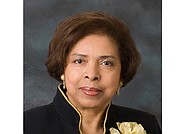Sister power making a difference
Dr. E. Faye Williams | 8/2/2018, 6 a.m.
I cannot count the times I have heard that black women don’t support each other. I always thought that was wishful thinking for those who wanted to play down our unity and our work for our people that ultimately benefit all people without regard to race, creed, color, religion and all the other things that often divide us. In order to succeed, black women have persisted for success against the greatest of odds.
Black women know that all anybody has to do is tell us what we can’t do and the game is on! While we welcome the help of others who want to see the change we need to make our nation more livable for all people, others are slowly beginning to see that black women are serious. And when we’ve got our eyes on the prize, nothing will stop us from doing our part to make a difference.
Charlotte, N.C., is named for Queen Charlotte who meets the “One Drop Rule”—meaning that if you have one drop of black blood, you are black. Since Charlotte was so successful as the queen of Britain and Ireland from 1761 to 1818 in which her mixed ancestry is convincingly revealed, there are still some who want to deny her black blood and question the legitimacy of her race.
Dr. Stephanie Myers recently wrote a well-researched book called “Invisible Queen” and she dispels any notion of Charlotte being anything other than a sister. Charlotte married into the British royal family at age 17, and history tells us that Charlotte understood her obligation to protect our people. It was no secret that she worked against slavery.
By the way, Charlottesville and Charlotte County, Va., are named for Queen Charlotte. So are the city of Charlotte and Mecklenburg County, N.C., named in her honor, as are many cities across the country and around the world. This sister used her sister power to do so many great things.
I was speaking recently with Dr. Lue Russell, chairperson of my organization in my home state of Louisiana. She told me the number of black women mayors has risen since we celebrated 19 a few months ago. Louisiana just added one more, so there are now 20 black women mayors in the state, including in the three largest cities of New Orleans, Baton Rouge and Shreveport.
We’re everywhere. There are black women mayors in Charlotte, N.C.; Charlottesville, Va.; Atlanta; Baltimore; Washington; San Francisco; Fontana and Compton, Calif.; Toledo, Ohio; Rochester, N.Y.; Tacoma, Wash.; Flint, Mich.; Gary, Ind.; and the list goes on. These sisters are representing a lot of people of all backgrounds and we haven’t heard a single uncouth word from any of them as we hear daily from the White House.
In Alabama, sister power showed up and elected U.S. Sen. Doug Jones. In Georgia, sister power played a big role in Stacey Abrams winning the Democratic nomination to run for governor. Even the nomination is historic.
In the 2016 presidential election, sister power voted 98 percent against this chaos we are now experiencing. Too bad more people didn’t vote like black women. If everybody voted like black women, we would be well on the road to resolving so many problems for so many people.
Let’s pray that on Nov. 6, more people will recognize sister power and follow our lead.
The writer is national president of the National Congress of Black Women Inc.







